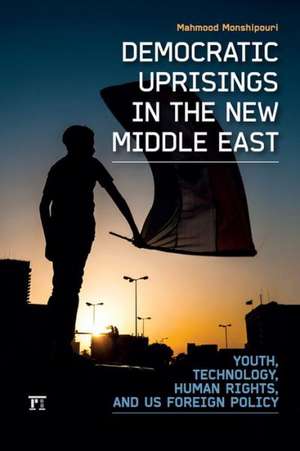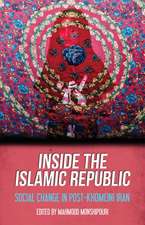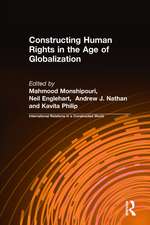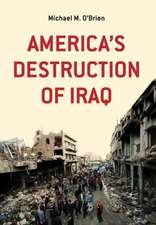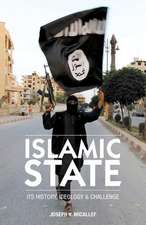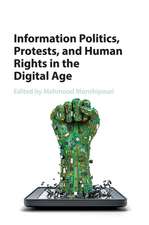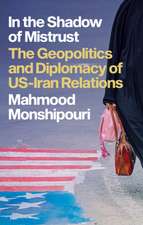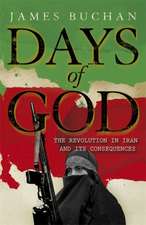Democratic Uprisings in the New Middle East: Youth, Technology, Human Rights, and US Foreign Policy: International Studies Intensives
Autor Mahmood Monshipourien Limba Engleză Paperback – 30 ian 2014
<br>
<br><b>Key features of the text:</b>
| Toate formatele și edițiile | Preț | Express |
|---|---|---|
| Paperback (1) | 384.59 lei 6-8 săpt. | |
| Taylor & Francis – 30 ian 2014 | 384.59 lei 6-8 săpt. | |
| Hardback (1) | 1163.66 lei 6-8 săpt. | |
| Taylor & Francis – 30 sep 2013 | 1163.66 lei 6-8 săpt. |
Din seria International Studies Intensives
- 46%
 Preț: 159.19 lei
Preț: 159.19 lei -
 Preț: 294.81 lei
Preț: 294.81 lei -
 Preț: 408.54 lei
Preț: 408.54 lei - 15%
 Preț: 459.43 lei
Preț: 459.43 lei -
 Preț: 489.99 lei
Preț: 489.99 lei -
 Preț: 409.48 lei
Preț: 409.48 lei - 31%
 Preț: 764.87 lei
Preț: 764.87 lei -
 Preț: 360.10 lei
Preț: 360.10 lei -
 Preț: 411.42 lei
Preț: 411.42 lei -
 Preț: 348.77 lei
Preț: 348.77 lei -
 Preț: 430.37 lei
Preț: 430.37 lei - 22%
 Preț: 353.80 lei
Preț: 353.80 lei - 17%
 Preț: 258.15 lei
Preț: 258.15 lei - 26%
 Preț: 819.48 lei
Preț: 819.48 lei -
 Preț: 381.72 lei
Preț: 381.72 lei - 18%
 Preț: 1161.28 lei
Preț: 1161.28 lei -
 Preț: 348.77 lei
Preț: 348.77 lei -
 Preț: 408.88 lei
Preț: 408.88 lei - 17%
 Preț: 255.37 lei
Preț: 255.37 lei -
 Preț: 380.86 lei
Preț: 380.86 lei -
 Preț: 361.08 lei
Preț: 361.08 lei -
 Preț: 286.84 lei
Preț: 286.84 lei -
 Preț: 363.96 lei
Preț: 363.96 lei -
 Preț: 462.60 lei
Preț: 462.60 lei
Preț: 384.59 lei
Nou
Puncte Express: 577
Preț estimativ în valută:
73.59€ • 77.04$ • 60.89£
73.59€ • 77.04$ • 60.89£
Carte tipărită la comandă
Livrare economică 05-19 aprilie
Preluare comenzi: 021 569.72.76
Specificații
ISBN-13: 9781612051352
ISBN-10: 1612051359
Pagini: 233
Dimensiuni: 152 x 229 x 15 mm
Greutate: 0.34 kg
Ediția:1
Editura: Taylor & Francis
Colecția Routledge
Seria International Studies Intensives
Locul publicării:Oxford, United Kingdom
ISBN-10: 1612051359
Pagini: 233
Dimensiuni: 152 x 229 x 15 mm
Greutate: 0.34 kg
Ediția:1
Editura: Taylor & Francis
Colecția Routledge
Seria International Studies Intensives
Locul publicării:Oxford, United Kingdom
Cuprins
Preface
1 Modern Technologies: Possibilities and Constraints
2 The Digital Age, Demographics, and an Ethos of Protest
3 Youthful Momentum, Social Media, Human Rights, and Political Economy
4 Emerging Identities: Emotions, Protests, and New Media
5 US-Iran Relations: From the Green Movement to the Arab Spring
6 The Arab Spring: Regional Implications and Beyond
Notes
References
Index
1 Modern Technologies: Possibilities and Constraints
2 The Digital Age, Demographics, and an Ethos of Protest
3 Youthful Momentum, Social Media, Human Rights, and Political Economy
4 Emerging Identities: Emotions, Protests, and New Media
5 US-Iran Relations: From the Green Movement to the Arab Spring
6 The Arab Spring: Regional Implications and Beyond
Notes
References
Index
Recenzii
Monshipouri offers a strong analysis of protest in the Middle East and North Africa (MENA), explaining how and why protests emerged and post-protest challenges... Moreover, the author incorporates a discussion of Iran's Green Movements, linking it to the Arab Spring and making the book unique among others that have attempted to explain these widespread movements. Summing Up: Highly recommended.
CHOICE
Democratic Uprisings in the New Middle East is, without doubt one of the best attempts to 'understand the extraordinary events of the 2011 Arab revolts and beyond' stemming from the empowerment achieved by youths that now 'levels the playing field' between citizens and governments... Democratic Uprisings in the New Middle East contributes to advancing our understanding of the Arab region and how countries such as the US should 'promote regional identity and harmony' especially if they positively can engage with the Islamists. The author recognizes the need for the US to consider its 'old policy of prohibiting diplomatic contacts with Hamas in Palestine and Hezbollah in Lebanon'... I have no hesitation therefore in recommending this book to anyone interested in the MENA region.
ACUNS Review
Monshipouri focuses on the effects of new-media technologies, demographic trends (especially the growth of a young populace and their current situation regarding educational and economic opportunities), and the hunger for human rights and democracy among the youth... He provides some very important charts regarding demographic trends, unemployment rates, literacy and educational achievement and expenditure, and access to information and communication technology that highlight how political, social, and economic problems and grievances combined with "global interconnectedness" has extended the scope of emotional identification at the level of humanity and increased the sense of moral responsibility for people at risk... Monshipouri contends that the only sensible course is diplomacy as there are a number of regional issues over which the US and Iran can cooperate -- perhaps together with Turkey and Qatar -- and that any military attack will "inflame Iranians' nationalistic sentiment," even among those opposed to the internal political restrictions imposed by Iran's government.
The Review of Politics
Democratic Uprisings in the New Middle East perfectly captures the complexity of the dynamics that set into motion the historic Arab revolutions of 2011. The book brings together the intersection of new media technologies, youth bulges, identity politics, and US-Iranian relations. . . . [A]n excellent, carefully crafted book.
Mehran Kamrava, author of The Modern Middle East: A Political History since the First World War
By placing Iran's Green Movement and the Arab world's 2011 uprisings side by side, Mahmood Monshipouri provides an insightful, balanced, and accessible contribution to the study of the Middle East's stunning wave of popular protests and change.
Shadi Mokhtari, American University
The most dramatic change in contemporary MENA has been orchestrated not by the traditional revolutionaries, radical fundamentalists, or the military, but by the young people of that region demanding freedom and dignity. In this lucidly written book, Mahmood Monshipouri explains how and why this transformation has taken place, and what challenges and opportunities it faces.
Cyrus Masroori, California State University-San Marcos
CHOICE
Democratic Uprisings in the New Middle East is, without doubt one of the best attempts to 'understand the extraordinary events of the 2011 Arab revolts and beyond' stemming from the empowerment achieved by youths that now 'levels the playing field' between citizens and governments... Democratic Uprisings in the New Middle East contributes to advancing our understanding of the Arab region and how countries such as the US should 'promote regional identity and harmony' especially if they positively can engage with the Islamists. The author recognizes the need for the US to consider its 'old policy of prohibiting diplomatic contacts with Hamas in Palestine and Hezbollah in Lebanon'... I have no hesitation therefore in recommending this book to anyone interested in the MENA region.
ACUNS Review
Monshipouri focuses on the effects of new-media technologies, demographic trends (especially the growth of a young populace and their current situation regarding educational and economic opportunities), and the hunger for human rights and democracy among the youth... He provides some very important charts regarding demographic trends, unemployment rates, literacy and educational achievement and expenditure, and access to information and communication technology that highlight how political, social, and economic problems and grievances combined with "global interconnectedness" has extended the scope of emotional identification at the level of humanity and increased the sense of moral responsibility for people at risk... Monshipouri contends that the only sensible course is diplomacy as there are a number of regional issues over which the US and Iran can cooperate -- perhaps together with Turkey and Qatar -- and that any military attack will "inflame Iranians' nationalistic sentiment," even among those opposed to the internal political restrictions imposed by Iran's government.
The Review of Politics
Democratic Uprisings in the New Middle East perfectly captures the complexity of the dynamics that set into motion the historic Arab revolutions of 2011. The book brings together the intersection of new media technologies, youth bulges, identity politics, and US-Iranian relations. . . . [A]n excellent, carefully crafted book.
Mehran Kamrava, author of The Modern Middle East: A Political History since the First World War
By placing Iran's Green Movement and the Arab world's 2011 uprisings side by side, Mahmood Monshipouri provides an insightful, balanced, and accessible contribution to the study of the Middle East's stunning wave of popular protests and change.
Shadi Mokhtari, American University
The most dramatic change in contemporary MENA has been orchestrated not by the traditional revolutionaries, radical fundamentalists, or the military, but by the young people of that region demanding freedom and dignity. In this lucidly written book, Mahmood Monshipouri explains how and why this transformation has taken place, and what challenges and opportunities it faces.
Cyrus Masroori, California State University-San Marcos
Descriere
As Egypt retreats from its newly elected government and Syria moves from one crisis to another, this book's reflection on the Arab Spring could not be more timely. Monshipouri's account of the role of emotion, solidarity, and online activism is informed by several trips to the region that continue to this day. Modern technologies and social media, organization on the ground, and challenges to shaping a country's political future after conflict are all essential subjects discussed in this important book, told in an engaging and accessible narrative.
